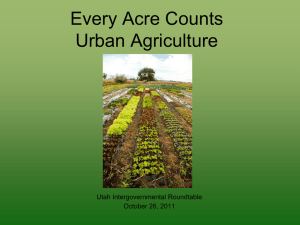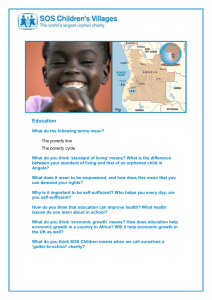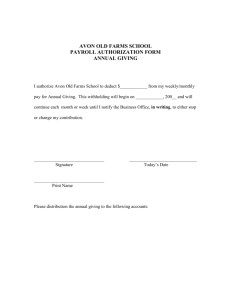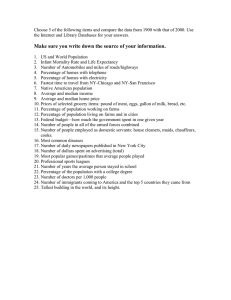FUTURE CITY IN THE SEA
advertisement
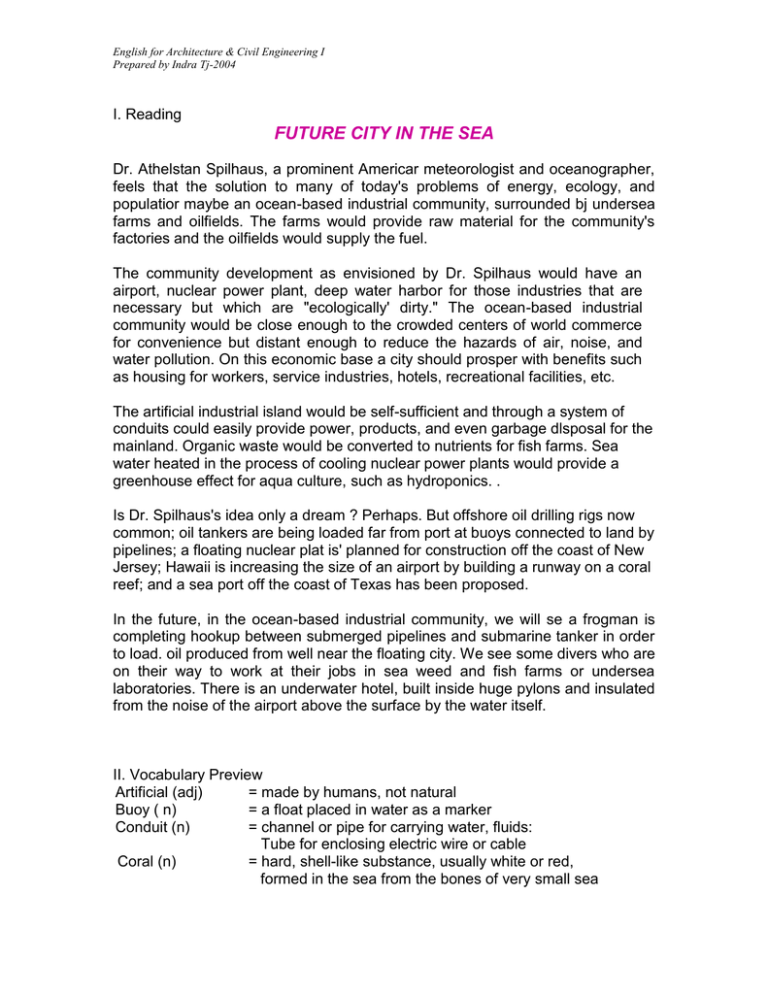
English for Architecture & Civil Engineering I Prepared by Indra Tj-2004 I. Reading FUTURE CITY IN THE SEA Dr. Athelstan Spilhaus, a prominent Americar meteorologist and oceanographer, feels that the solution to many of today's problems of energy, ecology, and populatior maybe an ocean-based industrial community, surrounded bj undersea farms and oilfields. The farms would provide raw material for the community's factories and the oilfields would supply the fuel. The community development as envisioned by Dr. Spilhaus would have an airport, nuclear power plant, deep water harbor for those industries that are necessary but which are "ecologically' dirty." The ocean-based industrial community would be close enough to the crowded centers of world commerce for convenience but distant enough to reduce the hazards of air, noise, and water pollution. On this economic base a city should prosper with benefits such as housing for workers, service industries, hotels, recreational facilities, etc. The artificial industrial island would be self-sufficient and through a system of conduits could easily provide power, products, and even garbage dlsposal for the mainland. Organic waste would be converted to nutrients for fish farms. Sea water heated in the process of cooling nuclear power plants would provide a greenhouse effect for aqua culture, such as hydroponics. . Is Dr. Spilhaus's idea only a dream ? Perhaps. But offshore oil drilling rigs now common; oil tankers are being loaded far from port at buoys connected to land by pipelines; a floating nuclear plat is' planned for construction off the coast of New Jersey; Hawaii is increasing the size of an airport by building a runway on a coral reef; and a sea port off the coast of Texas has been proposed. In the future, in the ocean-based industrial community, we will se a frogman is completing hookup between submerged pipelines and submarine tanker in order to load. oil produced from well near the floating city. We see some divers who are on their way to work at their jobs in sea weed and fish farms or undersea laboratories. There is an underwater hotel, built inside huge pylons and insulated from the noise of the airport above the surface by the water itself. II. Vocabulary Preview Artificial (adj) = made by humans, not natural Buoy ( n) = a float placed in water as a marker Conduit (n) = channel or pipe for carrying water, fluids: Tube for enclosing electric wire or cable Coral (n) = hard, shell-like substance, usually white or red, formed in the sea from the bones of very small sea English for Architecture & Civil Engineering I Prepared by Indra Tj-2004 animal Drill (v) = to make a hole using.a device called a "drill" Ecology (n) = science of relationships between organisms and their environments Envision (v) = to picture in the mind Frogman (n) = swimmer provided with breathing apparatus and other equipment for working under water Garbage (n) = waste; unwanted or spoiled food Hazard (n) = danger; peril; risk Hookup (n) = connection of a mechanism with a source of power Meteorologist (n) = scientist who studies the weather and weather conditions Nuclear ( adj) = atomic; using or derived from the energy of the nuclei ( central region) of the atom Nutrient (n) = something that nourishes and helps to grow like food Oceanographer (n) = scientist who studies the ocean and its phenomena Pipeline (n) = pipe for the transporting of water or petroleum products Pollution (n) = making soil, water, or the atmosphere dirty by discharge of poisonous substances Pylon (n) = steel tower Recreational (adj) = pertaining to activities or play designed to refresh a person mentally and physically Reef (n) = strip of rock, sand, or coral that rises up to or near the surface of a body of water Refinery (n) = industrial plant for purifying a crude substance, such as petroleum Rig (n) = any special equipment for a particular purpose Runway (n) = strip of level ground en which aircraft land or take off Seaweed (n) = any of a variety of underwater plants Self-sufficient (adj) = able to provide for oneself without the help of others Submerge (v) = to sink or go down into the water Tanker (n) = ship with large tanks, used to carry liquids. III. Answer the following questions based on the text. 1. Who is Dr. Athelstan Spilhaus ? What does he feel may be the answer to many modern problems regarding energy, ecology, and population? 2. What is the purpose of farms in an ocean-based community of oilfields ? 3. What are some of the industries that Dr. Spilhaus's ocean based community would contain? 4. How would the dangers of pollution be reduced in an ocean based industrial community? 5. For what reasons should an ocean-based city experience economic prosperity? 6. What would make the artificial community self-sufficient ? What would be done with organic waste? English for Architecture & Civil Engineering I Prepared by Indra Tj-2004 How would hydroponics be made possible ? 7. What developments in modern technology seem to show that Dr. Spilhaus's dream may some day be a reality ? 8. What kind of jobs would frogmen have in an ocean-based community? 9. What purpose would pylons serve In the dream community? 10.What serves to insulate underwater buildings from noise? B. Write T the statement is true and F if false 1.The ocean-based industrial community would be self-sufficient. 2.Dr. Spilhaus envisions undersea farms and oil fields near the ocean-based community. 3. A deep water harbor at the artificial industrial island provide a place for an airport and an oil refinery. 4.The ocean-based industrial community would be located in such isolated areas as Antartica, Tierra del Fuego, and Greenland. 5.One fuel for possibility would be to convert organic waste into factories and oil refineries. 6.Oil drilling rigs that can operate in the sea, off shore, are now rather common. 7.One concept is that of building hotels underwater inside giant pylons. 8.The ocean-based community would provide services for the mainland such as garbage disposal and power. IV.Vocabulary Expansion A. Place an X beside the word that does not belong in the following groups, and tell why it does not. 1. artificial- real - unnatural - false 2. float – buoy - marker - tanker 3. tube – pipe - conduit - runway 4. fuel – gasoline – oil - industry 5. waste - garbage – commerce - trash 6. nutrient - hazard – danger - peril 7. link - process - hookup - connection 8. oceanographer – meteorologist – photographer - ecologist 9. greenhouse - factory - industry - refinery 10. food - nutrient - coral – nourishment
